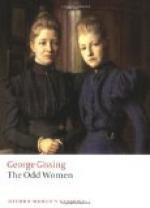’When your letter came, could I very well have acted otherwise than I did? It was not a flat refusal to believe him; all I asked was that things should be cleared up before our marriage. For his own sake he ought to have willingly agreed to that. He preferred to take my request as an insult. His unreasonable anger made me angry too. And now I don’t think we shall ever meet again unless as mere acquaintances.’
‘I think,’ commented the listener, ’that he behaved with extraordinary impudence.’
’In the first proposal? But I myself attach no importance to the marriage ceremony.’
‘Then why did you insist upon it?’ asked Mary, with a smile that might have become sarcastic but that her eye met Rhoda’s.
‘Would you have received us?’
‘In the one case as readily as in the other.’
Rhoda was silent and darkly thoughtful.
‘Perhaps I never felt entire confidence in him.’
Mary smiled and sighed.
CHAPTER XXVIII
THE BURDEN OF FUTILE SOULS
’My own dearest love, if I could but describe to you all I have suffered before sitting down to write this letter! Since our last meeting I have not known one hour of quietness. To think that I missed you when you called and left that note—for it was you yourself, was it not? The journey was horrible, and the week that I have spent here—I assure you I have not slept for more than a few minutes at a time, and I am utterly broken down by misery. My darling’—etc. ’I regard myself as a criminal; if you have suffered a thousandth part of what I have, I deserve any punishment that could be devised. For it has all been my fault. Knowing as I did that our love could never end in happiness, it was my duty to hide what I felt. I ought never to have contrived that first meeting alone—for it was contrived; I sent my sisters away on purpose. I ought never’—etc. ’The only reflection that can ever bring me comfort is that our love has been pure. We can always think of each other without shame. And why should this love ever have an end? We are separated, and perhaps shall never see each other again, but may not our hearts remain for ever true? May we not think’—etc. ’If I were to bid you leave your home and come to me, I should be once more acting with base selfishness. I should ruin your life, and load my own with endless self-reproach. I find that even mere outward circumstances would not allow of what for a moment we dreamt might be possible, and of that I am glad, since it helps me to overcome the terrible temptation. Oh, if you knew how that temptation’—etc. ’Time will be a friend to both of us, dearest Monica. Forget each other we never can, we never will. But our unsullied love’—etc.




